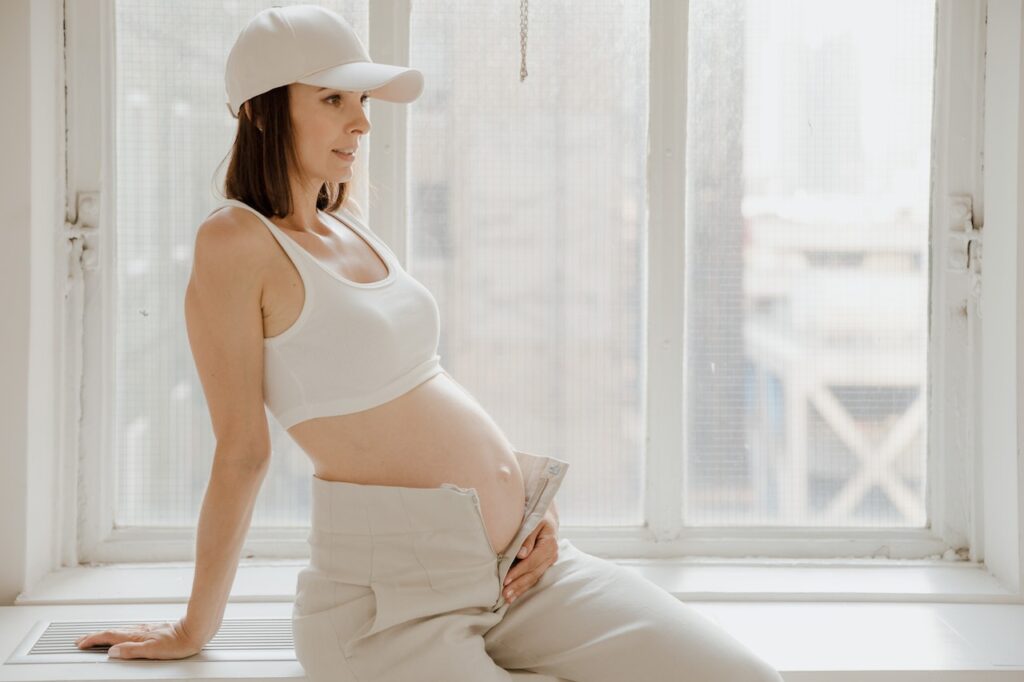Pregnancy is a beautiful and exciting time in a woman’s life, but it can also be overwhelming and stressful. With so many changes happening in your body and so many things to prepare for, it can be hard to know where to start. That’s why having a list of pregnancy must-haves can be a game-changer.
From comfortable maternity clothes to prenatal vitamins, there are certain items that every mom-to-be should have on hand. These essentials can help you stay comfortable, healthy, and prepared for your little one’s arrival. In this article, we’ll explore some of the most important pregnancy must-haves and why they’re so essential.
Key Takeaways
- Pregnancy can be overwhelming, but having a list of must-haves can help.
- There are certain items every mom-to-be should have on hand for comfort, health, and preparation.
- From maternity clothes to prenatal vitamins, these essentials can help you feel your best during pregnancy.
Understanding Pregnancy
Pregnancy is a beautiful and exciting journey, but it can also be overwhelming and confusing, especially for first-time mothers. Understanding the basics of pregnancy can help ease some of the anxiety and make the experience more enjoyable.
Pregnancy typically lasts for around 40 weeks and is divided into three trimesters. The first trimester is from week one to week 12, the second trimester is from week 13 to week 28, and the third trimester is from week 29 until delivery. During pregnancy, a woman’s body undergoes numerous changes to accommodate the growing fetus.
One of the most important aspects of pregnancy is determining the due date, which is usually calculated based on the first day of the last menstrual period. However, due dates are not always accurate and can vary by a few weeks. It is essential to keep track of prenatal appointments and ultrasounds to monitor the baby’s growth and ensure a healthy pregnancy.
Amniotic fluid is a vital component of pregnancy as it surrounds and protects the baby in the uterus. Healthcare providers monitor the level of amniotic fluid during prenatal visits to ensure that there is enough to support the baby’s growth and development.
Pregnancy can also have an impact on a woman’s health, and it is essential to have regular check-ups with a healthcare provider. They can monitor the mother’s blood pressure, weight, and any other health concerns that may arise during pregnancy.
In summary, understanding the basics of pregnancy, including the trimesters, due date, amniotic fluid, and healthcare provider’s role, is crucial for a healthy and enjoyable pregnancy experience.
Dealing with Pregnancy Symptoms
Pregnancy can bring about a variety of symptoms, some of which can be uncomfortable or even painful. Here are some tips for dealing with common pregnancy symptoms:
Nausea and Morning Sickness
Many women experience nausea and vomiting during pregnancy, especially in the first trimester. To help alleviate these symptoms, try:
- Eating small, frequent meals throughout the day
- Avoiding spicy or greasy foods
- Drinking plenty of fluids, especially water
- Trying ginger, either in tea or as a supplement
- Getting plenty of rest
Aches and Pains
As the body changes to accommodate a growing baby, many women experience aches and pains in various parts of the body. To help alleviate these symptoms, try:
- Practicing good posture
- Using a pregnancy pillow for support while sleeping
- Doing gentle stretches or prenatal yoga
- Taking warm baths or using a heating pad (on low)
Heartburn
Many women experience heartburn during pregnancy, especially in the later stages. To help alleviate this symptom, try:
- Eating small, frequent meals throughout the day
- Avoiding spicy or acidic foods
- Sitting up straight after meals
- Using a pregnancy-safe antacid, as recommended by your doctor
Hormones
Pregnancy hormones can cause a variety of symptoms, including mood swings, fatigue, and skin changes. To help manage these symptoms, try:
- Getting plenty of rest
- Eating a healthy, balanced diet
- Staying active with gentle exercise
- Using pregnancy-safe skincare products
Lower Back, Hips, and Pelvis
As the body changes during pregnancy, many women experience discomfort in the lower back, hips, and pelvis. To help alleviate these symptoms, try:
- Practicing good posture
- Using a pregnancy pillow for support while sleeping
- Doing prenatal yoga or other gentle exercise
- Using a pregnancy support belt, as recommended by your doctor
Knees
As the body gains weight during pregnancy, some women may experience knee pain. To help alleviate this symptom, try:
- Wearing supportive shoes
- Avoiding high-impact exercise
- Doing gentle exercise, such as swimming or prenatal yoga
- Using a pregnancy support belt, as recommended by your doctor
Nausea Relief and Morning Sickness Relief
There are a variety of remedies that can help alleviate nausea and morning sickness during pregnancy, including:
- Ginger (either in tea or as a supplement)
- Vitamin B6 supplements
- Acupressure wristbands
- Prescription medications, as recommended by your doctor
Digestion
Pregnancy can affect digestion, leading to symptoms such as constipation and bloating. To help alleviate these symptoms, try:
- Eating a high-fiber diet
- Drinking plenty of fluids, especially water
- Staying active with gentle exercise
- Using a pregnancy-safe laxative, as recommended by your doctor
Hip Pain
As the body changes during pregnancy, some women may experience hip pain. To help alleviate this symptom, try:
- Practicing good posture
- Using a pregnancy pillow for support while sleeping
- Doing prenatal yoga or other gentle exercise
- Using a pregnancy support belt, as recommended by your doctor
Nutrition and Health During Pregnancy
Maintaining good nutrition and health during pregnancy is essential for the health of both the mother and the growing baby. A healthy diet that includes a variety of nutrient-dense foods is crucial for providing the necessary vitamins and minerals needed for a healthy pregnancy.
Prenatal vitamins are an important supplement during pregnancy, as they provide additional nutrients that may be lacking in a pregnant woman’s diet. They typically contain folic acid, iron, and other important vitamins and minerals.
Folic acid is particularly important during the early stages of pregnancy, as it can help prevent birth defects of the brain and spine. It is recommended that women take 400-800 micrograms of folic acid daily, either through a prenatal vitamin or through foods such as leafy green vegetables, beans, and fortified cereals.
Iron is also important during pregnancy, as it helps to produce hemoglobin, the protein in red blood cells that carries oxygen to the body’s tissues. Pregnant women need more iron than non-pregnant women, and may need to take an iron supplement in addition to their prenatal vitamin.
Choosing organic foods whenever possible can help reduce exposure to pesticides and other harmful chemicals. Caffeine intake should also be limited during pregnancy, as excessive caffeine consumption has been linked to an increased risk of miscarriage.
Staying hydrated is also important during pregnancy, as it can help prevent constipation and reduce the risk of preterm labor. Drinking plenty of water, as well as consuming hydrating foods such as fruits and vegetables, can help ensure proper hydration.
Calcium is another important nutrient during pregnancy, as it helps build strong bones and teeth in the growing baby. Non-GMO sources of calcium such as dairy products, leafy green vegetables, and fortified foods can help meet the increased calcium needs during pregnancy.
Overall, maintaining a healthy diet and lifestyle during pregnancy is essential for the health of both the mother and the growing baby. Consultation with a healthcare provider can help ensure proper nutrient intake and overall health during pregnancy.
Pregnancy Must-Haves
When it comes to pregnancy, there are certain must-haves that can make the journey a lot more comfortable. Here are some of the essentials that every pregnant woman should consider:
Maternity Clothes
Maternity clothes are a must-have for any pregnant woman. As your belly grows, your regular clothes will start to feel tight and uncomfortable. Maternity clothes are designed to accommodate your growing bump and provide the necessary support. Some essential items include maternity jeans, leggings, and layering tanks.
Belly Band
A belly band is a great accessory that can provide additional support to your growing bump. It can also help alleviate back pain and discomfort. A belly band can be worn throughout the day, and it is especially useful during exercise.
Pregnancy Pillow
A pregnancy pillow can help you get a good night’s sleep during pregnancy. It is designed to support your belly, back, and hips, and it can help alleviate pregnancy-related discomfort. There are many different types of pregnancy pillows available, including full-body pillows, wedge pillows, and C-shaped pillows.
Nursing Bra
A good nursing bra is an essential item for any breastfeeding mother. It should provide good support and be comfortable to wear. Look for a nursing bra that is adjustable and has easy access for breastfeeding.
Water Bottle
Staying hydrated is important during pregnancy, and a good water bottle can help you do just that. Look for a stainless steel water bottle that is insulated to keep your water cool throughout the day.
Pregnancy-Safe Skin Care
Pregnancy can cause changes to your skin, and it is important to use pregnancy-safe skin care products. Look for products that are free of harmful chemicals and fragrances.
Preggie Pop Drops
Morning sickness is a common symptom of pregnancy, and Preggie Pop Drops can help alleviate nausea. They are made with natural ingredients and come in a variety of flavors.
Multivitamin and DHA
Taking a prenatal multivitamin and DHA supplement is important for the health of both mother and baby. It can help ensure that you are getting all the necessary nutrients for a healthy pregnancy.
Belly Oil and Butter
As your belly grows, it can become itchy and uncomfortable. Belly oil and butter can help alleviate dryness and itchiness. Look for products that are made with natural ingredients and are safe for pregnancy.
Compression Socks
Compression socks can help alleviate swelling and discomfort in the legs and feet. They are especially useful during long periods of sitting or standing.
These are just a few of the pregnancy must-haves that can make the journey a lot more comfortable. Remember to consult with your healthcare provider before using any new products during pregnancy.
Changes in the Body
Pregnancy is a time of significant changes in a woman’s body. These changes are largely due to hormonal fluctuations and the growth and development of the fetus. Some of the most common changes that women experience during pregnancy include stretch marks, breast changes, and body aches.
Stretch marks are a common concern for many pregnant women. These marks occur when the skin is stretched beyond its capacity and the underlying tissue tears. While there is no surefire way to prevent stretch marks, there are some things that women can do to minimize their appearance. Using a moisturizer or oil on the skin can help to keep it supple and elastic, which can reduce the likelihood of stretch marks developing.
Breast changes are another common occurrence during pregnancy. As the body prepares for lactation, the breasts may become sore, swollen, and tender. Women may also notice that their nipples become darker and more sensitive. Wearing a supportive bra can help to alleviate some of the discomfort associated with these changes.
Milk production is another significant change that occurs during pregnancy. As the baby grows, the body begins to produce colostrum, a nutrient-rich fluid that provides essential nutrients to the newborn. After birth, the body will continue to produce milk to meet the baby’s nutritional needs.
Soothing aches and pains is also an essential part of pregnancy. Many women experience back pain, leg cramps, and other discomforts as their bodies adjust to the growing fetus. Using a pregnancy pillow or engaging in gentle exercise can help to alleviate some of these symptoms.
Overall, pregnancy is a time of significant changes in a woman’s body. While these changes can be uncomfortable, they are a natural part of the process. Using pregnancy-specific products and connecting with other moms can help women to navigate these changes with confidence and ease.
Pregnancy Apps and Resources
Expecting mothers have access to a plethora of pregnancy apps and resources that can help them stay informed and organized throughout their pregnancy journey. These apps and resources can provide valuable information, helpful tips, and support during this exciting time.
Pregnancy Apps are a popular choice among expecting mothers. These apps offer a variety of features such as tracking the baby’s growth and development, providing information on prenatal care, and offering tips on nutrition and exercise. Some popular pregnancy apps include:
- The Bump: This app offers personalized content and a helpful pregnancy tracker that allows users to track their baby’s growth and development, as well as their own health and wellness.
- What to Expect: This app provides daily tips and advice based on the user’s due date, as well as a pregnancy tracker and a community forum where users can connect with other expecting mothers.
- BabyCenter: This app offers a pregnancy tracker, articles on pregnancy and parenting, and a community forum where users can connect with other expecting mothers.
In addition to pregnancy apps, there are also a variety of pregnancy resources available for expecting mothers. These resources can include books, websites, and support groups. Some popular pregnancy resources include:
- Mayo Clinic Guide to a Healthy Pregnancy: This book provides comprehensive information on pregnancy and childbirth, as well as tips on nutrition, exercise, and prenatal care.
- American Pregnancy Association: This website offers a variety of resources on pregnancy and childbirth, including articles on prenatal care, nutrition, and exercise, as well as a community forum where users can connect with other expecting mothers.
- Other Moms: Connecting with other expecting mothers can provide valuable support and advice during pregnancy. Joining a support group or online community can help expecting mothers feel less isolated and provide a safe space to share experiences and ask questions.
Overall, pregnancy apps and resources can be valuable tools for expecting mothers. With so many options available, it’s important to choose ones that provide accurate information and support, and to always consult with a healthcare provider for medical advice.
Frequently Asked Questions
What are some must-have items for a comfortable pregnancy?
Expectant mothers should invest in a good quality maternity pillow to support their growing belly and relieve pressure on their back. A comfortable, supportive bra is also a must-have, as well as comfortable shoes with good arch support. A belly band can also help support the belly and alleviate back pain.
What are the best maternity clothes to invest in?
Maternity clothes that are versatile and comfortable are the best investment. Look for stretchy fabrics that will grow with your belly, such as leggings and maxi dresses. A few key pieces, such as a pair of jeans and a blazer, can also be mixed and matched to create multiple outfits.
What are some essential products for the first trimester?
Prenatal vitamins are essential during the first trimester to ensure the baby receives all necessary nutrients. Ginger chews or tea can also help alleviate morning sickness. A good quality body lotion can help prevent stretch marks.
What are the top pregnancy products recommended by moms?
Moms recommend a good quality breast pump for nursing mothers, as well as a nursing pillow for comfortable feeding. A baby carrier is also a popular choice for hands-free bonding time.
What should be on my pregnancy shopping list by month?
During the first trimester, focus on prenatal vitamins and comfortable clothes. In the second trimester, invest in a maternity pillow and belly band. During the third trimester, prepare for baby’s arrival with a breast pump, nursing pillow, and baby carrier.
What are some essential items for the second trimester?
A pregnancy journal can be a great way to document the journey, as well as monitor weight gain and baby’s growth. A body pillow can also help alleviate discomfort during sleep. A good quality water bottle can help ensure proper hydration.




